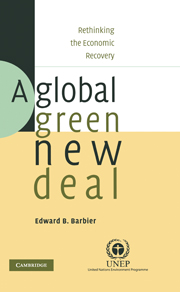Book contents
- Frontmatter
- Contents
- List of figures
- List of tables
- List of boxes
- Foreword
- Preface
- Acknowledgements
- Part I Why a Global Green New Deal?
- Part II The Key Components of a Global Green New Deal
- Part III The Role of the International Community
- 6 Promoting global governance
- 7 Facilitating access to finance
- 8 Enhancing trade incentives
- 9 Conclusion: international priorities for a Global Green New Deal
- Part IV Towards a Greener World Economy
- Appendix 1 PIIE–WRI analysis of a green recovery program for the United States
- Appendix 2 Pew comparative analysis of clean energy jobs and investments in the United States, 1998–2007
- Glossary
- Index
- References
8 - Enhancing trade incentives
Published online by Cambridge University Press: 05 June 2012
- Frontmatter
- Contents
- List of figures
- List of tables
- List of boxes
- Foreword
- Preface
- Acknowledgements
- Part I Why a Global Green New Deal?
- Part II The Key Components of a Global Green New Deal
- Part III The Role of the International Community
- 6 Promoting global governance
- 7 Facilitating access to finance
- 8 Enhancing trade incentives
- 9 Conclusion: international priorities for a Global Green New Deal
- Part IV Towards a Greener World Economy
- Appendix 1 PIIE–WRI analysis of a green recovery program for the United States
- Appendix 2 Pew comparative analysis of clean energy jobs and investments in the United States, 1998–2007
- Glossary
- Index
- References
Summary
The current financial and economic crisis is having a significant impact on trade volumes and revenue, because of falling global demand and a tightening of trade financing. The slowing of global trade is particularly daunting for those countries that depend on export-led growth. Low-income economies, and particularly those resource-dependent economies with a high share of primary products to total exports, will feel the consequence of the crisis more significantly through trade channels.
Although trade is projected to decline as the global economic downturn worsens, and will recover slowly with the world economy, it is less clear what role trade policy can play in either addressing the immediate crisis or in supporting the implementation of the Global Green New Deal. As trade was not the underlying cause of the current economic crisis, it is doubtful that changes in trade policy, at least in the short term, will be able to reverse the current economic climate. Despite this caveat, one clear opportunity may be to focus on new trade financing and trade facilitation financing packages in order to promote the initiatives outlined in the GGND. There is also a strong argument for ensuring that trade policies “do no harm” in the short term through the adoption of protectionist measures. Finally, trade policy will have a critical role over the medium term in promoting some of the key components of the GGND.
- Type
- Chapter
- Information
- A Global Green New DealRethinking the Economic Recovery, pp. 201 - 207Publisher: Cambridge University PressPrint publication year: 2010



